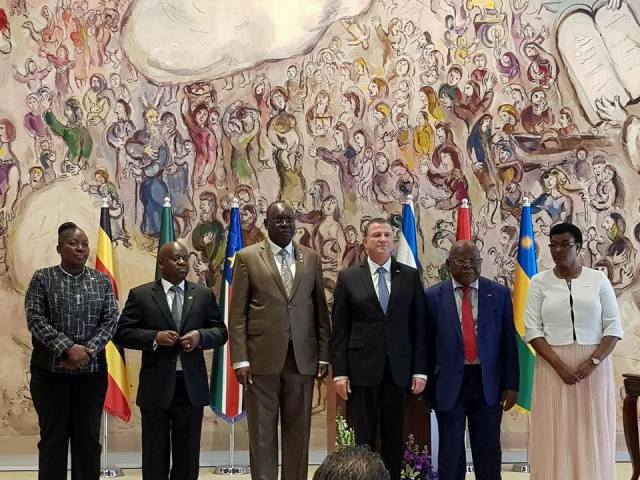The Knesset is hosting a first-of-a-kind conference attended by five African heads of parliament, an event that will tighten the bonds between Israel and Africa.
By: World Israel News Staff
Five African heads of parliament are in Israel to take part in a historic three-day parliamentary seminar at the Knesset, one of the largest conferences of parliaments heads ever held at the Knesset.
The African leaders came from Ghana, Rwanda, South Sudan, Tanzania and Uganda.
“This is a historic event at the Knesset,” Knesset Speaker Edelstein told his African counterparts. “Only a year ago we celebrated the 50th anniversary of the Knesset Building in Jerusalem, an in all its dozens of years we have not seen such a large number of parliament heads visit the Knesset at the same time. Together we will all work to improve the work of our parliaments, for the benefit of our peoples.”
He expressed hope that the conference will tighten the relations between the parliaments of all the participating countries.
Aaron Michael Oquaye, Speaker of the Parliament of Ghana, said his country needs Israel’s “extensive experience in security, particularly in dealing with cyber warfare.” He called on Israeli companies invest in the economies of developing countries and “transfer their technological knowhow to those countries, in order to help them deal with inequality in the world.”
Donatille Mukabalisa, Speaker of the Chamber of Deputies of the Rwandan Parliament, said that the thriving Israeli economy is attracting foreign investments.
Rwanda has opened an embassy in Israel, Israel recently announced it is opening an embassy in Rwanda.
Anthony Lino Makana, Speaker of South Sudan`s Transitional National Legislative Assembly, said “the ancient relations between Israel and Africa have existed since biblical times, as have the friendly relations with South Sudan.”
He invited Israeli investors to find agricultural opportunities in South Sudan. “To those who claim that my country is not developed, I say that lack of development allows for endless opportunities for investment in the country’s infrastructure,” he stated.
Rebecca Alitwala Kadaga, Speaker of the Ugandan Parliament, said that “Israel and Uganda have been cooperating since the 1960s. Every resident of Uganda wants to visit Jerusalem at least once in his or her life.”
Sharing the Knesset’s Fields of Expertise
The parliamentary seminar includes discussions of various subjects with Knesset Members from most of the parliamentary groups.
Mukabalisa, Speaker of the Chamber of Deputies of Rwanda, one of the few parliaments with a female majority, addressed a panel discussion on women`s empowerment and gender equality.
“Women (have significant influence on) the positions of decision-makers in my country, and in certain cases it goes beyond the usual equality,” Speaker Mukabalisa said.
Knesset Director General Albert Sakharovich briefed the African parliament heads on the various measures the Knesset is taking to make the parliament building accessible to the public. He also gave a detailed explanation on how the Knesset building was made accessible to persons with disabilities.
The African heads of parliament will on Wednesday meet with President Reuven Rivlin and Prime Minister Benjamin Netanyahu. They will also tour Jerusalem as guests of Minister of Jerusalem Affairs and Heritage MK Ze’ev Elkin.
Over the past three years, the Knesset has greatly expanded its foreign affairs work and has signed agreements with no fewer than 20 parliaments, including Rwanda, Uganda, Côte D`Ivoire, Ethiopia and Kenya.
Netanyahu has made improving relations with African nations a priority.
In his address to AIPAC last March, Netanyahu observed that Israel has “diplomatic relations with 161 countries, more than at any time in our history.”
Last July, he made a historic trip to East Africa, where he visited Uganda, Kenya, Rwanda and Ethiopia. Weeks later, the Republic of Guinea, a Muslim-majority African nation, restored diplomatic ties with Israel after a 49-year break.
In August, Senegal and Guinea, two Muslim-majority West African nations, sent their first-ever full-time ambassadors to Israel.
Netanyahu returned from Kenya last week, where he held a series of bilateral meetings with attending heads of African states.
Israel has a long history of sharing its expertise with African countries, and Jerusalem hopes that stronger ties will lead to a shift in voting trends at the UN and other global forums, thus reversing what Netanyahu has labeled the “automatic majority against Israel.”


